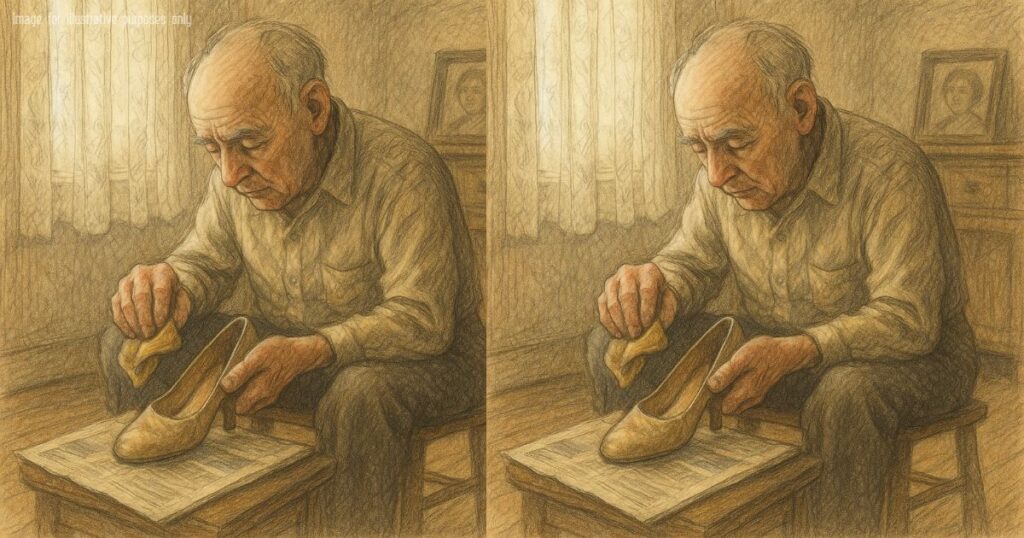The call came two weeks later.
Leo had just finished trimming the edges of his late wife’s rosebush when the landline rang—a sound so rare these days, it made him jump. He wiped his hands on his pants and shuffled back inside.
“Mr. Leo?”
The voice was deeper than before. Still young, but steadier. It was Anthony.
“I just wanted to say… my dad got the job. The one he wore the shoes to. He’s working again. He’s even smiling again. My mom says you saved us.”
Leo leaned against the counter, heart thudding a slow, grateful beat. “I didn’t save anybody, son. Your father walked in on his own two feet.”
“Yeah, but you helped them shine.”
There was a pause.
“My dad said you should come to dinner sometime. He wants to thank you. And—I’d like to learn more. About the shoes. About the whole… thing.”
Leo swallowed. “You sure you want to? Takes patience.”
“I think I’m ready now.”
—
They came the following Sunday, a casserole in hand and shy smiles on their faces. Anthony’s father—John—was lean, mid-forties, with the look of a man who’d weathered storms but hadn’t let them break him. He gripped Leo’s hand like a brother.
The shoes on his feet caught Leo’s eye. Still shining. The polish holding strong.
Over meatloaf and mashed potatoes, they talked—about work, the city, the past. And after dessert, Anthony pulled up a stool beside the table where the Kiwi can waited, opened like an invitation.
Leo didn’t say much. He didn’t need to. He just placed a worn oxford in front of the boy, and together they began.
This time, Anthony moved with care. He dipped the rag, spread the polish in circles. His strokes were slow, focused. He didn’t ask to rush. He didn’t check his phone. He just worked.
Pop-pop-pop went the cloth. Leo closed his eyes and listened. The rhythm was the same one his father had made, and his father before him. A song without notes. A memory in motion.
—
Spring turned to summer. Anthony came every Sunday. Sometimes alone, sometimes with his dad. The table became a kind of altar. The shoes: offerings.
Word spread, as it tends to in places where people still talk over fences. A neighbor dropped off her late husband’s dress shoes—“Just to make them look nice again.” A postal worker asked if Leo taught kids. A teacher brought her father’s boots from the old country.
It wasn’t a business. Leo refused money. But he always made time.
One morning, months later, Leo found a package on his stoop. Inside was a brand-new can of Kiwi polish, wrapped in brown paper, with a handwritten note:
“To carry the shine forward. – A.”
He smiled, held the can to his chest like a prayer.
That Sunday, Anthony arrived in a pressed shirt and brought his little sister. “She wants to help too,” he said. “Is that okay?”
Leo gestured to the stool. “Grab a brush.”
—
When Leo passed, the church was packed.
Not with dignitaries or men in suits. But with factory workers, kids in their Sunday shoes, single mothers, tired fathers. People whose shoes had been touched by his hands.
Anthony, now seventeen, stood beside the closed casket. In his hands: a folded cloth. The same one Leo had used the very first day they met. He didn’t cry—not there. But when the pastor asked if anyone had words to share, he stepped forward and said:
“He taught me how to polish shoes. But more than that, he taught me how to slow down. To take pride. To care about something, even if no one else notices. He said shining shoes was about honoring the ground we walk on—and the people who walked before us. I think… I think Leo’s shine will never fade.”
And then, softly, like a whisper carried on the wind, came the pop-pop-pop of cloth against leather—dozens of people shining their own shoes in the pews, a tribute of rhythm and love.
The last pair Leo had polished—his wife’s pumps—sat at the altar beside his own oxfords. Gleaming.
Side by side. Ready for the next walk, wherever it led.
—
Some men leave behind fortunes. Leo left a shine. A quiet legacy passed from hand to hand, from heart to heart—one polished step at a time.


